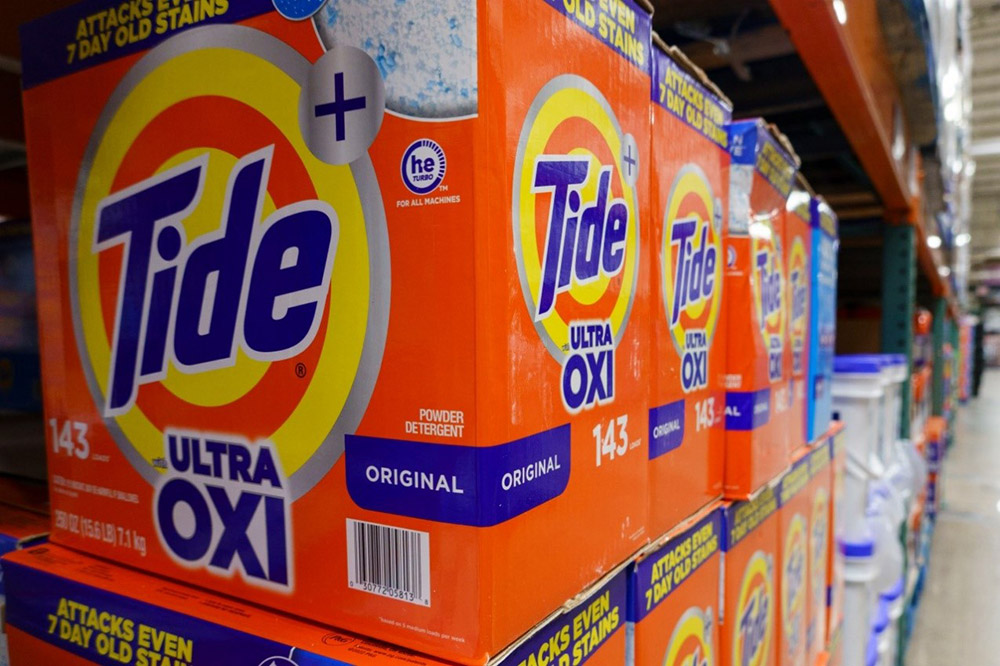
在受特朗普政府關(guān)稅大棒沖擊的公司名單上,再添兩家消費(fèi)品巨頭——百事公司(PepsiCo)和寶潔公司(Procter & Gamble),。
寶潔擁有汰漬(Tide)洗衣粉,、吉列(Gillette)剃須產(chǎn)品和Charmin衛(wèi)生紙等數(shù)十個(gè)品牌。該公司上周四下調(diào)了全年銷售和利潤(rùn)預(yù)期,,主要原因包括關(guān)稅及消費(fèi)需求波動(dòng),。寶潔首席執(zhí)行官詹慕仁對(duì)CNBC表示“關(guān)稅必然引發(fā)通脹”,并暗示旗下眾多產(chǎn)品可能很快就會(huì)提價(jià),。此前寶潔預(yù)計(jì)截至6月底的本財(cái)年,,有機(jī)銷售額將增長(zhǎng)3%至5%,但最新預(yù)測(cè)已下調(diào)至僅增長(zhǎng)2%,。
百事公司則不再預(yù)期今年每股收益會(huì)增長(zhǎng),,將原因歸結(jié)為關(guān)稅推高成本及消費(fèi)者的焦慮情緒。此前百事公司預(yù)計(jì)每股收益將實(shí)現(xiàn)中等個(gè)位數(shù)百分比增長(zhǎng),。百事公司首席執(zhí)行官龍嘉德表示:“我們預(yù)計(jì)波動(dòng)性和不確定性將加劇,,特別是與全球貿(mào)易局勢(shì)相關(guān)的動(dòng)向,,這將推高我們的供應(yīng)鏈成本?!?/p>
顯然,,這種不確定性對(duì)面向消費(fèi)者的公司股價(jià)沖擊大于其他公司。在上周四早盤交易中,,百事股價(jià)下跌3%,,寶潔股價(jià)下挫4%,而道瓊斯工業(yè)平均指數(shù)小幅上漲,。
兩家公司正竭力減輕關(guān)稅對(duì)業(yè)務(wù)的沖擊,,但特朗普政府頻繁調(diào)整關(guān)稅措施導(dǎo)致公司的應(yīng)對(duì)難度陡增。
據(jù)彭博社報(bào)道,,寶潔首席財(cái)務(wù)官安德烈·舒爾滕表示,,在產(chǎn)品漲價(jià)之前,公司會(huì)嘗試調(diào)整采購(gòu)來(lái)源或改變產(chǎn)品配方,。此外,,寶潔會(huì)努力在每次提價(jià)時(shí)進(jìn)行產(chǎn)品升級(jí)。該公司已觀察到消費(fèi)者行為的變化,,這提醒公司需要保持謹(jǐn)慎,。寶潔首席執(zhí)行官詹慕仁對(duì)雅虎財(cái)經(jīng)表示,在多重因素引發(fā)擔(dān)憂的背景下,,消費(fèi)者正通過(guò)減少每周洗衣次數(shù)來(lái)節(jié)省洗衣粉用量,。關(guān)稅導(dǎo)致的高物價(jià)可能只會(huì)加劇這種憂慮。
百事首席執(zhí)行官龍嘉德則認(rèn)為,,即便在尋求應(yīng)對(duì)關(guān)稅之策時(shí),,這家食品飲料巨頭也會(huì)謹(jǐn)慎避免引發(fā)運(yùn)營(yíng)混亂,稱公司的目標(biāo)是“將對(duì)運(yùn)營(yíng),、消費(fèi)者和客戶關(guān)系以及業(yè)務(wù)長(zhǎng)期健康發(fā)展的影響降至最低”,。
與大多數(shù)首席執(zhí)行官一樣,寶潔的詹慕仁避免直接批評(píng)特朗普政府,。他甚至對(duì)CNBC表示,,政府“始終保持開放對(duì)話態(tài)度”,但寶潔花費(fèi)了“大量時(shí)間”研判經(jīng)濟(jì)走勢(shì)及消費(fèi)支出動(dòng)向,。(財(cái)富中文網(wǎng))
譯者:劉進(jìn)龍
審校:汪皓
在受特朗普政府關(guān)稅大棒沖擊的公司名單上,,再添兩家消費(fèi)品巨頭——百事公司(PepsiCo)和寶潔公司(Procter & Gamble)。
寶潔擁有汰漬(Tide)洗衣粉,、吉列(Gillette)剃須產(chǎn)品和Charmin衛(wèi)生紙等數(shù)十個(gè)品牌,。該公司上周四下調(diào)了全年銷售和利潤(rùn)預(yù)期,主要原因包括關(guān)稅及消費(fèi)需求波動(dòng),。寶潔首席執(zhí)行官詹慕仁對(duì)CNBC表示“關(guān)稅必然引發(fā)通脹”,,并暗示旗下眾多產(chǎn)品可能很快就會(huì)提價(jià),。此前寶潔預(yù)計(jì)截至6月底的本財(cái)年,有機(jī)銷售額將增長(zhǎng)3%至5%,,但最新預(yù)測(cè)已下調(diào)至僅增長(zhǎng)2%,。
百事公司則不再預(yù)期今年每股收益會(huì)增長(zhǎng),將原因歸結(jié)為關(guān)稅推高成本及消費(fèi)者的焦慮情緒,。此前百事公司預(yù)計(jì)每股收益將實(shí)現(xiàn)中等個(gè)位數(shù)百分比增長(zhǎng),。百事公司首席執(zhí)行官龍嘉德表示:“我們預(yù)計(jì)波動(dòng)性和不確定性將加劇,特別是與全球貿(mào)易局勢(shì)相關(guān)的動(dòng)向,,這將推高我們的供應(yīng)鏈成本?!?/p>
顯然,,這種不確定性對(duì)面向消費(fèi)者的公司股價(jià)沖擊大于其他公司。在上周四早盤交易中,,百事股價(jià)下跌3%,,寶潔股價(jià)下挫4%,而道瓊斯工業(yè)平均指數(shù)小幅上漲,。
兩家公司正竭力減輕關(guān)稅對(duì)業(yè)務(wù)的沖擊,,但特朗普政府頻繁調(diào)整關(guān)稅措施導(dǎo)致公司的應(yīng)對(duì)難度陡增。
據(jù)彭博社報(bào)道,,寶潔首席財(cái)務(wù)官安德烈·舒爾滕表示,,在產(chǎn)品漲價(jià)之前,公司會(huì)嘗試調(diào)整采購(gòu)來(lái)源或改變產(chǎn)品配方,。此外,,寶潔會(huì)努力在每次提價(jià)時(shí)進(jìn)行產(chǎn)品升級(jí)。該公司已觀察到消費(fèi)者行為的變化,,這提醒公司需要保持謹(jǐn)慎,。寶潔首席執(zhí)行官詹慕仁對(duì)雅虎財(cái)經(jīng)表示,在多重因素引發(fā)擔(dān)憂的背景下,,消費(fèi)者正通過(guò)減少每周洗衣次數(shù)來(lái)節(jié)省洗衣粉用量,。關(guān)稅導(dǎo)致的高物價(jià)可能只會(huì)加劇這種憂慮。
百事首席執(zhí)行官龍嘉德則認(rèn)為,,即便在尋求應(yīng)對(duì)關(guān)稅之策時(shí),,這家食品飲料巨頭也會(huì)謹(jǐn)慎避免引發(fā)運(yùn)營(yíng)混亂,稱公司的目標(biāo)是“將對(duì)運(yùn)營(yíng),、消費(fèi)者和客戶關(guān)系以及業(yè)務(wù)長(zhǎng)期健康發(fā)展的影響降至最低”,。
與大多數(shù)首席執(zhí)行官一樣,寶潔的詹慕仁避免直接批評(píng)特朗普政府,。他甚至對(duì)CNBC表示,,政府“始終保持開放對(duì)話態(tài)度”,,但寶潔花費(fèi)了“大量時(shí)間”研判經(jīng)濟(jì)走勢(shì)及消費(fèi)支出動(dòng)向。(財(cái)富中文網(wǎng))
譯者:劉進(jìn)龍
審校:汪皓
Add PepsiCo and Procter & Gamble, two of the largest consumer products makers, to the list of companies getting smacked by the Trump administration’s tariff saga.
P&G, the maker of dozens of brands such as Tide detergent, Gillette grooming products, and Charmin toilet paper, on Thursday cut its annual sales and profit forecasts, in large part because of tariffs and volatility in consumer demand. P&G CEO Jon Moeller told CNBC that “tariffs are inherently inflationary” and that higher prices on many of its products are likely coming soon. In an earlier forecast, P&G said it expected organic sales growth to be 3% to 5% for the fiscal year ending in late June. But now it expects that to be only 2%.
Over at PepsiCo, the company no longer expects its earnings per share to rise this year, blaming rising costs because of tariffs as well as consumer anxiety. It had previously said it expected mid-single-digit percentage growth. “We expect more volatility and uncertainty, particularly related to global trade developments, which we expect will increase our supply-chain costs,” chief executive Ramon Laguarta said.
Clearly that uncertainty is dinging consumer-facing companies’ stocks more than others. PepsiCo was down 3% in morning trading, while P&G slipped 4%. The Dow Jones industrial average was up slightly.
Both companies are scrambling to mitigate the impact of tariffs on their businesses, efforts made more difficult with the frequent changes to tariffs by the Trump administration.
P&G finance chief Andre Schulten said, however, that before hiking prices, P&G would try moving sourcing around or change formulations, according to Bloomberg. Moreover, P&G would seek to accompany any price hike with a product improvement. The company has been seeing consumer behavior changing, reminding it to be cautious. CEO Moeller told Yahoo Finance that consumers are doing fewer laundry loads each week to conserve detergent at a time many factors are causing them to worry. High prices because of tariffs would likely only worsen those concerns.
As for PepsiCo’s Laguarta, he suggested that the beverage and food maker would be careful to avoid creating chaos in its operations even as it looked for ways to handle tariffs, saying the goal was “to
minimize disruption to our operations, our consumer and customer relationships, and the long-term health of our business.”
Like most CEOs, P&G’s Moeller avoided faulting the Trump administration. He even told CNBC that the administration has been “very open to dialogue” but that P&G has been spending a “fair amount of time” trying to determine what direction the economy and consumer spending were taking.






